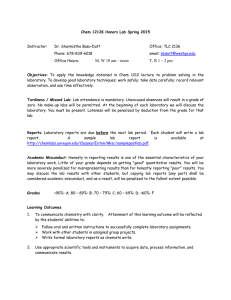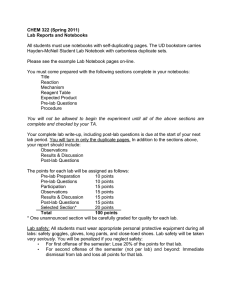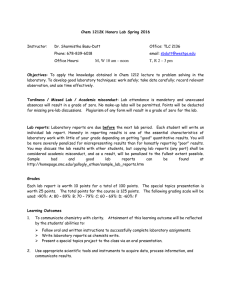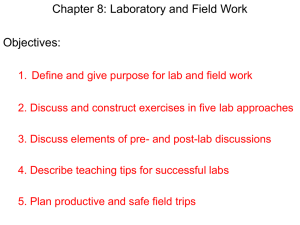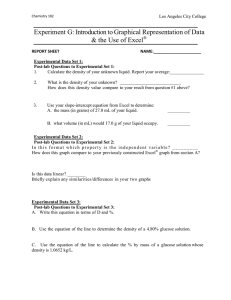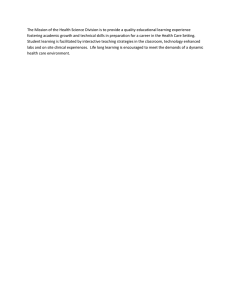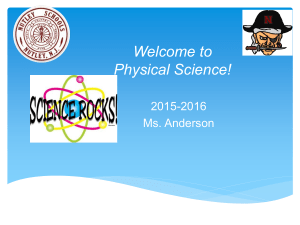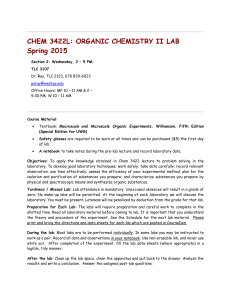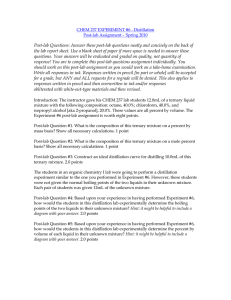CHEM 1151L_Otwell
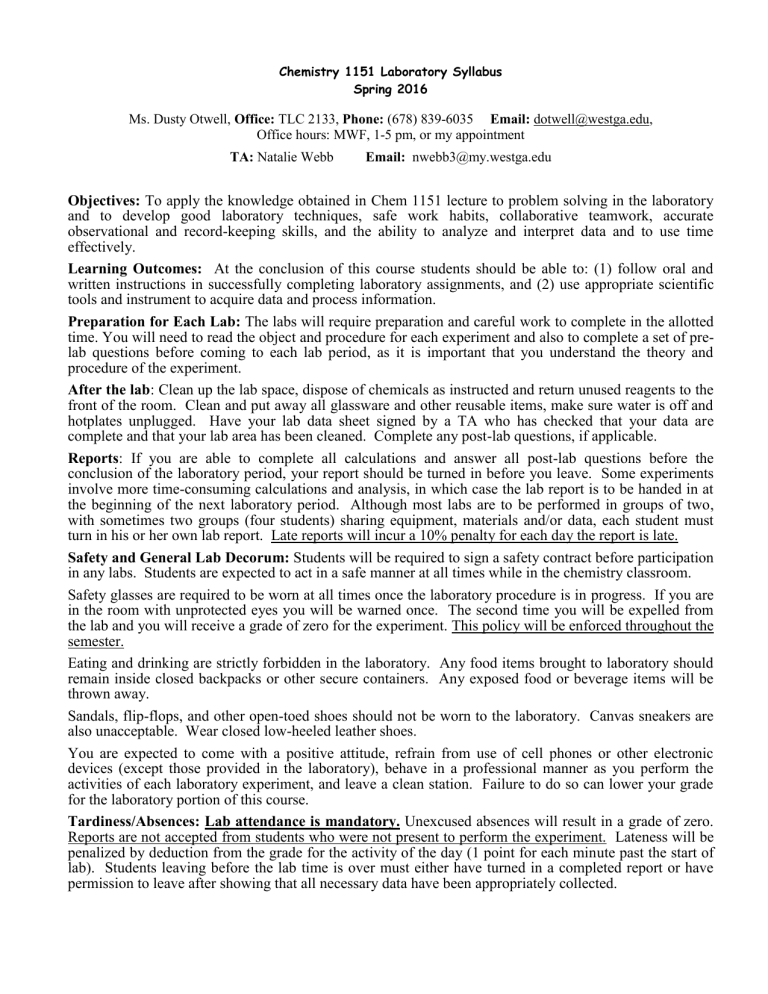
Chemistry 1151 Laboratory Syllabus
Spring 2016
Ms. Dusty Otwell, Office: TLC 2133, Phone: (678) 839-6035 Email: dotwell@westga.edu,
Office hours: MWF, 1-5 pm, or my appointment
TA: Natalie Webb Email: nwebb3@my.westga.edu
Objectives: To apply the knowledge obtained in Chem 1151 lecture to problem solving in the laboratory and to develop good laboratory techniques, safe work habits, collaborative teamwork, accurate observational and record-keeping skills, and the ability to analyze and interpret data and to use time effectively.
Learning Outcomes: At the conclusion of this course students should be able to: (1) follow oral and written instructions in successfully completing laboratory assignments, and (2) use appropriate scientific tools and instrument to acquire data and process information.
Preparation for Each Lab: The labs will require preparation and careful work to complete in the allotted time. You will need to read the object and procedure for each experiment and also to complete a set of prelab questions before coming to each lab period, as it is important that you understand the theory and procedure of the experiment.
After the lab : Clean up the lab space, dispose of chemicals as instructed and return unused reagents to the front of the room. Clean and put away all glassware and other reusable items, make sure water is off and hotplates unplugged. Have your lab data sheet signed by a TA who has checked that your data are complete and that your lab area has been cleaned. Complete any post-lab questions, if applicable.
Reports : If you are able to complete all calculations and answer all post-lab questions before the conclusion of the laboratory period, your report should be turned in before you leave. Some experiments involve more time-consuming calculations and analysis, in which case the lab report is to be handed in at the beginning of the next laboratory period. Although most labs are to be performed in groups of two, with sometimes two groups (four students) sharing equipment, materials and/or data, each student must turn in his or her own lab report. Late reports will incur a 10% penalty for each day the report is late.
Safety and General Lab Decorum: Students will be required to sign a safety contract before participation in any labs. Students are expected to act in a safe manner at all times while in the chemistry classroom.
Safety glasses are required to be worn at all times once the laboratory procedure is in progress. If you are in the room with unprotected eyes you will be warned once. The second time you will be expelled from the lab and you will receive a grade of zero for the experiment. This policy will be enforced throughout the semester.
Eating and drinking are strictly forbidden in the laboratory. Any food items brought to laboratory should remain inside closed backpacks or other secure containers. Any exposed food or beverage items will be thrown away.
Sandals, flip-flops, and other open-toed shoes should not be worn to the laboratory. Canvas sneakers are also unacceptable. Wear closed low-heeled leather shoes.
You are expected to come with a positive attitude, refrain from use of cell phones or other electronic devices (except those provided in the laboratory), behave in a professional manner as you perform the activities of each laboratory experiment, and leave a clean station. Failure to do so can lower your grade for the laboratory portion of this course.
Tardiness/Absences: Lab attendance is mandatory.
Unexcused absences will result in a grade of zero.
Reports are not accepted from students who were not present to perform the experiment. Lateness will be penalized by deduction from the grade for the activity of the day (1 point for each minute past the start of lab). Students leaving before the lab time is over must either have turned in a completed report or have permission to leave after showing that all necessary data have been appropriately collected.
Grade Determination : The grade for each week’s laboratory activity is based on the reports turned in, minus any penalties for lateness or other infractions. There are 100 possible points for each lab, 20 points for the pre-lab questions and 80 points for the remainder of the report. Points are deducted for data recorded to the improper number of significant figures or with missing or incorrect units. Points are also deducted for mathematical errors in the calculations and for incorrect responses to any post-lab questions.
Below is a tentative schedule of the planned laboratory activities this semester. There will be a total of 12 lab grades. The lowest two of these 12 grades will be dropped and the overall lab average will be the average of the best 10 lab grades.
Academic Misconduct : Honesty in reporting results is one of the essential characteristics of your; laboratory work. Little of your grade depends on getting "good" quantitative results. You will be more severely penalized for misrepresenting results than for honestly reporting "poor" results. You may discuss the lab results with other groups, but copying lab reports (any part) shall be considered academic misconduct, and penalized accordingly.
Tentative Lab Schedule
Friday Dates Lab Activity
January 1 5 Laboratory Safety; QEP
January 22 Lab #1: Density (Ch. 2)
January 29 Lab #2: Flame Tests (Ch. 4)
February 5 Lab #3: Half Lives (Ch. 5)
February 12 Lab #4: Ionic Compounds (Ch. 6)
February 19 Lab #5: Covalent Compounds (Ch. 6)
February 26 Lab #6: Mole Ratios (Ch. 7)
March 4 Lab #7: Hydrate
March 11 Lab #8: Gas Reactions (Ch. 8)
March 18 Spring Break! No labs this week.
March 25 Lab #9: Precipitation Reactions (Ch. 9)
April 1 Lab #10: Dumas Method (Ch. 8)
April 8 Lab #11: Equilibria (Ch. 10)
April 15 Lab #12: Titration (Ch. 11)
April 22
